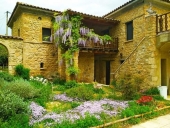
 5
5




Michael Cox wrote:
How many degree level people does the world need in ethnobotany? I suspect that the number is small because, as you imply, the knowledge is readily accessible to the interested lay-person through books and other resources. Degrees shine on the level of an overall society when they are deep, and that deep expertise brings special insights that are valuable to a society in a way that is uniquely distinctive. But even then, the utility of having more people with the same narrow expertise is limited.
 5
5




Lina
https://catsandcardamom.com
 5
5




Invasive plants are Earth's way of insisting we notice her medicines. Stephen Herrod Buhner
Everyone learns what works by learning what doesn't work. Stephen Herrod Buhner
 7
7




Lina Joana wrote:Wish I had a crystal ball.

 8
8




Some places need to be wild
 8
8




Whathever you are, be a good one.
___________________________________
 4
4




If there is one thing the Wizard of Oz has taught me, it is not to trust school teachers on bicycles.
 7
7





 9
9




 6
6




paul wheaton wrote:I have tried to follow all the comments here. It sounds like, in the scenario of trying to figure out what to do now, **if** there is gonna be 70% unemployment in two years is ...
exactly the stuff I suggested and nothing else.
True?
Did I miss anything?
A humble home and a large garden is the only solution?
College is currently a fools errand if it leaves you in debt.
for those currently without a humble home and a large garden, there are two paths:
- skip
- join a gardening gardeners program
 2
2




 11
11














 1
1




Some places need to be wild
 2
2




Purdue's numbers are more conservative, citing University of Minnesota trials with an average production of 30,000 lbs/acre for sunchokes, ...
 5
5




paul wheaton wrote:Of course I have no clue what will actually happen. Speculations on top of speculations.
At the same time, the changes are starting now.
 4
4




According to recent data from the U.S. Bureau of Labor Statistics and other sources:
High School Diploma: Median annual earnings are around $49,192.
Bachelor's Degree: Median annual earnings are around $79,716.












 1
1




 4
4














 2
2




Some places need to be wild
 9
9




 7
7




If there is one thing the Wizard of Oz has taught me, it is not to trust school teachers on bicycles.










 4
4




Some places need to be wild
 6
6




Tereza Okava wrote:As it is, I can't believe people aren't beating a path to Wheaton Labs for the chance to have a place to live AND learn stuff.
 8
8




 5
5




 2
2
















 3
3




 1
1




paul wheaton wrote:College is currently a fools errand if it leaves you in debt.
"The genius of American farm experts is very well demonstrated here: they can take a solution and divide it neatly into two problems." -Wendell Berry
 7
7




 3
3




Tereza Okava wrote:
Maybe that opens up more possibilities for gardener type situations. As it is, I can't believe people aren't beating a path to Wheaton Labs for the chance to have a place to live AND learn stuff.
Lina
https://catsandcardamom.com
 9
9




Is anyone going to pay you a living wage to split wood by hand, build junk pole fences, harvest rhubarb in a homestead setting?
To sleep in a bunkhouse and get food in exchange for 40 hrs of work per week?
Bootcamp doesn’t set you up for a career in our current society, and doesn’t pretend to. From my understanding of the the program, it teaches you to run a small homestead mostly by hand, with occasional use of the excavator and tractor.
 8
8




If there is one thing the Wizard of Oz has taught me, it is not to trust school teachers on bicycles.
 2
2
 2
2




paul wheaton wrote:
Work? I hope that nobody sees it as work. It is a chance to grow your own food and build your own shelter. At a pretty easy pace.
paul wheaton wrote:
I think the bootcamp is amazing for existing gardeners, natural builders and homesteaders that love to create. Now there are people that do it with you, five days a week.
I think the bootcamp is the foundation for retiring to a gert package.
Your words seem to be about getting a person into the workforce. I think the bootcamp is about getting people out of the workforce and into retirement.
paul wheaton wrote:
Another angle: A lot of people want to get into homesteading. They buy land, put years in, and burn out. They then sell everything for less than they paid. The bootcamp is a far better path: cheaper to get into and there is no loss. Building a style of community at a pace that dodges the burnout issues.
Lina
https://catsandcardamom.com
 2
2




 1
1




 2
2




 4
4





|
Well THAT's new! Comfort me, reliable tiny ad:
The new permaculture playing cards kickstarter is now live!
https://www.kickstarter.com/projects/paulwheaton/garden-cards
|








